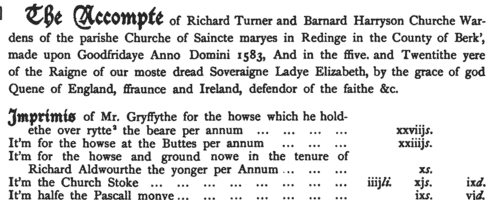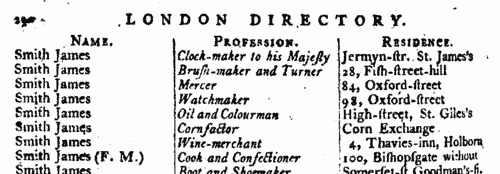Alwright Surname Ancestry ResultsOur indexes 1000-1999 include entries for the spelling 'alwright'. In the period you have requested, we have the following 8 records (displaying 1 to 8): Buy all | | | Get all 8 records to view, to save and print for £50.00 |
These sample scans are from the original record. You will get scans of the full pages or articles where the surname you searched for has been found. Your web browser may prevent the sample windows from opening; in this case please change your browser settings to allow pop-up windows from this site. Surrey Sessions
(1661-1663)
Surrey Sessions Rolls and Order Books. These are abstracts of sessional orders, minutes of criminal cases, memoranda and other entries of record taken from the Order Books from October 1661 to January 1663, inclusive, and the Sessions Rolls for October 1661, January 1662, April 1662, July 1662, October 1662 and January 1663.ALWRIGHT. Cost: £4.00.  | Sample scan, click to enlarge

| Inhabitants of Reading in Berkshire
(1550-1667)
The borough of Reading in Berkshire comprised three ancient parishes - St Giles, St Lawrence and St Mary. The churchwardens' accounts of Reading St Mary from 1550 to 1667 were transcribed by Francis N. A. Garry and A. G. Garry and published in 1893. The accounts, usually signed off by the two churchwardens and two surveyors of the highways for the year, listed the income and expenditure of the church. Income included annual payments for seats in the pews; rents from church property; fees for the use of the pall and for tolling the knell (knill) at funerals, and for opening graves; and sums received for 'gatherings', i. e. money gathered from communicants at Easter, Hocktide, Mayday, Hallowmas, Christmas and Whit. Expenditure was largely on maintaining the church fabric, and paying the minor officials - most of the names found on this side of the account are of local workmen busy with repairs.ALWRIGHT. Cost: £4.00.  | Sample scan, click to enlarge

| Citizens of London: Weavers
(1724)
A list of the persons who polled for Charles Goodfellow esquire at the late election for a member of parliament to represent the city of London, held 23rd to 28th November 1724. Full names are given, surname first, arranged by the livery companies to which the citizens belonged. This list was published in The Daily Post and elsewhere: 'Gentlemen, we desire you will carefully examine the following list of polsters, and in case you find yourselves or friends polled by others, or any polled who are dead or absent, or who have no right, that you'll give immediate notice thereof at Salter's Hall in Swithin's Lane, where attendance will be daily given from 8 a-clock in the morning till 9 a-clock at night. It is not doubted but the endeavours to obtain a law to secure your invaded rights and privileges will be soon successful, this should now excite you to a diligent search after false pollers, which will in all probability make the majority greater for sir Richard Hopkins. N.B. The scrutineers so far as they have proceeded, do find a much greater number of false pollers for Mr Goodfellow, than for sir Richard Hopkins.'ALWRIGHT. Cost: £6.00.  | Sample scan, click to enlarge

|  Masters and Apprentices
(1732) Masters and Apprentices
(1732)
Apprenticeship indentures and clerks' articles were subject to a 6d or 12d per pound stamp duty: the registers of the payments usually give the master's trade, address, and occupation, and the apprentice's father's name and address, as well as details of the date and length of the apprenticeship. 3 January to 30 December 1732ALWRIGHT. Cost: £8.00.  | Sample scan, click to enlarge

|  Apprentices and articled clerks
(1765) Apprentices and articled clerks
(1765)
Apprenticeship indentures and clerks' articles were subject to a 6d or 12d per pound stamp duty (late payment of the 6d rate attracted double duty (D D) of 12d): the registers of the payments usually give the master's trade, address, and occupation, and the apprentice's name, as well as details of the date and length of the apprenticeship. 2 January to 31 December 1765.ALWRIGHT. Cost: £8.00.  | Sample scan, click to enlarge

| Traders and Merchants in London
(1791)
The Universal British Directory was published in five volumes, starting in 1791. The professions included in the London section are very diverse: the addresses are mostly from central London. Some are marked 'F. M.', meaning Freeholder of Middlesex.ALWRIGHT. Cost: £6.00.  | Sample scan, click to enlarge

| Deaths, Marriages, Bankrupts, Dividends and Patents
(1821-1822)
Death notices and obituaries, marriage and birth notices, bankrupts and dividends, and patents, as reported in the Monthly Magazine or British Register. Includes some marriages and deaths from Ireland, Scotland and abroad.
ALWRIGHT. Cost: £6.00.  | Sample scan, click to enlarge

|  Persons of standing recommending London police recruits
(1843-1857) Persons of standing recommending London police recruits
(1843-1857)
The Metropolitan Police Register of Joiners (MEPO 4/334) lists policemen joining the force 1 January 1843 to 1 April 1857 (warrant numbers 19893 to 35804). The register is alphabetical, in so far as the recruits are listed chronologically grouped under first letter of surname. It gives Date of Appointment, Name, Number of Warrant, Cause of Removal from Force (resigned, dismissed, promoted or died), and Date of Removal. Although the register was closed for new entrants at the end of 1842, the details of removals were always recorded, some being twenty or more years later. Those recruits not formerly in the police, the army, or some government department, were required to provide (normally) at least two letters of recommendation from persons of standing, and details of these are entered on the facing pages. Where a recruit was only recently arrived in the metropolis, the names and addresses of the recommenders can be invaluable for tracing where he came from. Those recruits not formerly in the police, the army, or some government department, were required to provide (normally) at least two letters of recommendation from persons of standing, and details of these are entered on the facing pages: the names in these are indexed here (the police recruits are indexed separately and not included here). Recruits transferred from other forces or rejoining the force did not normally need recommendations - in the latter case, former warrant numbers are given - but some recommendations are from police inspectors, even other constables. Recruits coming from the army sometimes have general military certificates of good conduct, but most often have a letter from their former commanding officer; recruits recommended by government departments (most often the Home Office) similarly have letters from the head of department. But the great majority of the names and addresses in these pages are of respectable citizens having some sort of personal acquaintance with the recruit. Where more than two recommendations were provided, the clerk would only record one or two, with the words 'and others'. Tradesmen are sometimes identified as such by their occupations; there are some gentry. Although the bulk of these names are from London and the home counties, a scattering are from further afield throughout Britain and Ireland. ALWRIGHT. Cost: £8.00.  | Sample scan, click to enlarge

|
Research your ancestry, family history, genealogy and one-name study by direct access to original records and archives indexed by surname.
|











